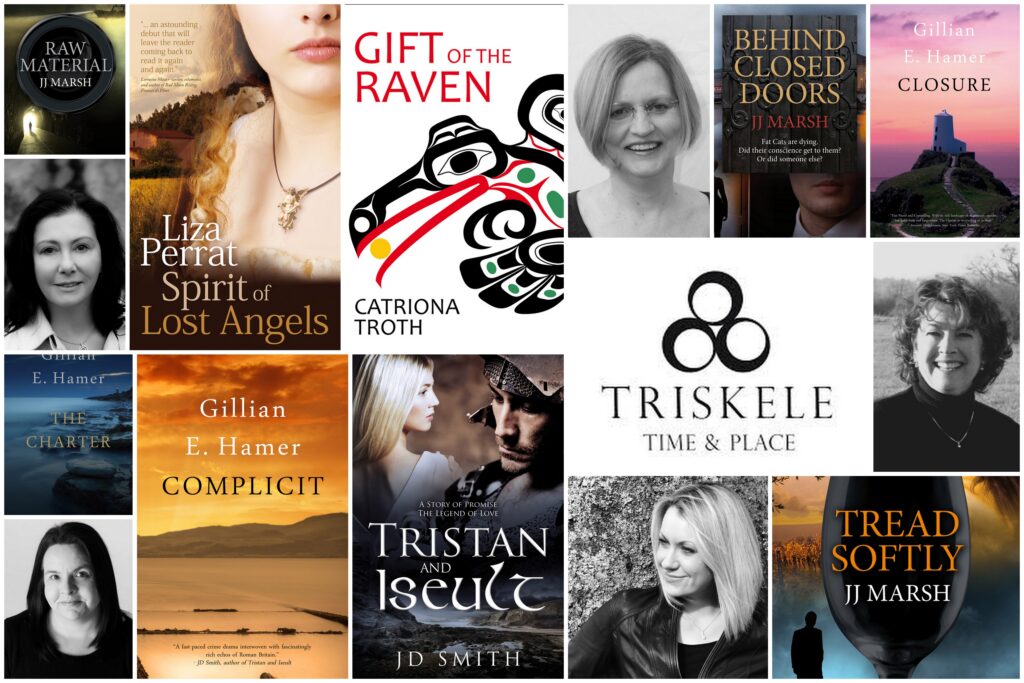
Novelist J J Marsh from the Triskele Books collective
When indie authors have to learn and keep on top of many skills to self-publish and market their books, it's too easy to neglect the craft at its heart: the writing. J J Marsh shares her experience of an online course developed by the members of the Triskele Books collective to help each other hone their writing skills.
Triskele Books developed from an online critique group of writers who wanted to improve. We gradually grew to trust and admire each other, both the work and the critical eye, so in 2010, we discussed forming an author collective. A third way of publishing: independence, creative control and the highest standards of writing and publication.
Since then, we’ve published 21 books of our own and three of our associates. We could write a book about what we’ve learned about publishing – matter of fact, we did – and we’re still educating ourselves.
Now we operate as a business: running a virtual team, managing international communications, handling projects and launches, marketing our work and promoting our brand. Where does that leave the original strategy of improving as writers? No doubt producing more books helps our writing mature in a professional sense, (just look at the language I’ve used in the previous two paragraphs) but when is it playtime?

Collectively productive
How We Created Our Own Writing Course
The five of us found each other because we all wanted to be better writers. Still do. So last summer, we put together our own creative writing course. We each sought out exercises to hone a skill we wanted to develop, threw them into the mix and I shaped them into ten modules.
Here’s what it looks like:
- Story Fundamentals: Premise, Prize, Price, Central Dramatic Question
- Character Foundation: how well do you know your MC?
- Characters in a series: development, arc, consistency
- On the page: Show, tell, shortcuts
- The Craft of Voice I: POV, person, tense, characters’ voice
- The Craft of Voice II: developing authorial voice, style, idiolect
- Theme: use of subconscious association, language choice
- Poetry exercise (language): hints and atmosphere
- Prose push ups: Description and Dialogue
- Prose push ups: Subtext
The course ran over 20 weeks. One week I would introduce the exercise. The following week we shared the results, gave feedback on the work and suggested how the exercise could be tweaked. We were all equally curious and cautious when starting out: ‘Really busy this month’ … ‘I’ll do what I can while on holiday’… ‘Not sure how much time I can devote to this’.
So each module was designed to be a series of 5-15 minute exercises enabling each writer to choose as much or as little as would fit into their week.
Easy to Follow Rules
The rules are simple: if the activity is useful, do it. If you want, share the results with the group. Keep criticism constructive and feel free to add suggestions on honing the exercise. For example, not all of us are writing a series, so the third session could be skipped. Personally I had no intention of doing the poetry module, but amazed myself by finding it both beneficial and moving. Some exercises were an all-round success, such as the character questionnaire created by Sheila Bugler and myself.
How and Why It Worked
As for where the activities came from: courses we’ve taught, workshops we’ve attended, exercises available online, literary magazines, writing books, etc. This couldn’t be called a Creative Writing Course in any broad sense as we specifically selected areas where we, as experienced writers, wanted to change up a gear. And because of its targeted nature, it worked.

The Triskele team – and what a team they are!
That constant low-level guilty hum – you should be writing your 2K quota, you are a bad person – was absent. We gave ourselves permission to learn. Permission to play. All of us enjoyed the opportunity to experiment and try things completely irrelevant to the WIP. I’d forgotten the thrill of getting emotional reactions to my words which were not filtered through the ‘professional’ lens.
Not quite as refreshing as a retreat by the Mediterranean, but as a creative shot in the arm, it’s sociable, imagination-stretching, focused and best of all, great fun.
OVER TO YOU Which writing course would you recommend? What's your favourite way to refine your writing craft? We'd love to know!
How to create your own online #writing course to share with author friends by @JJMarsh1 of @TriskeleBooks #ww Share on X





UPDATE: We’ve refined our course and drawn in some top tutors with specialist knowledge. Our plan is to make this a free online summer course starting July 1st 2016 and ending early September. All welcome, no fees or demands, but feedback would be great. http://triskelebooks.blogspot.ch/2016/05/triskeles-creative-spark.html
[…] How Triskele authors created their own online writing course – by Jill Marsh […]
Great piece, thanks for sharing what you have learned so far individually and collectively.
Like Barry, I admire (and slightly envy) what you have created. I would love to see something similar for non-fiction writers.
– damon
[…] You saw the Creative Writing Course blog I wrote for The Alliance of Independent Authors, […]
Thanks for the responses.
Barry, there’s no marketing here. We don’t own the exercises (I linked to one we do, so gave it away). There’s no book or course or hook here, just a group sharing what we’ve done.
Pauline, that’s exactly what got us all excited. We realised we had a bunch of ideas and areas of expertise. I’m still reeling from how much we learned from our ‘passive’ knowledge.
Janey, yes, we will. We’ll need to refine this and make it more widely useful. It’s important to say this is not a money-making scheme, just writers sharing with writers. I’ll keep you posted and would love to get you involved. We appreciate your honesty.
We’ll publish what we did and where we found it on the Triskele blog, but the aim is to develop and add to what we have. All ideas welcome!
Late last year I did a MOOC version of the Uni of Iowa’s Writing Workshop (apparently most prestigious, with many successful alumni). The videos, required reading, writing exercises, tests, and some of the forums were great. I really enjoyed it and would like to do something similar again.
Drawbacks were: peer review – as an Editor, I took this seriously, but almost all of my reviews were basically useless – lots of praise and cheering you on, nothing substantive. The writing exercises were also a bit different depending on whether you were a ‘beginning’ writer (I put myself in that category) or an ‘experienced’ writer: interestingly all the bad submissions, the worst writing, was from the ‘experienced’ writers!
Jill, will you be running any version of your course again? If so, is it possible to apply?
Alternatively, I’d love to hear of any other well-regarded MOOCs I could do.
Love the idea of playing at writing at a higher level. Very cool idea!
Hello Jill.
What you and your colleagues did sounds as though it was useful to you, and I’m not a little envious of the camaraderie among the members of your group. But please don’t turn this into another marketed how-to guide for writers. Far too many are floating around already.